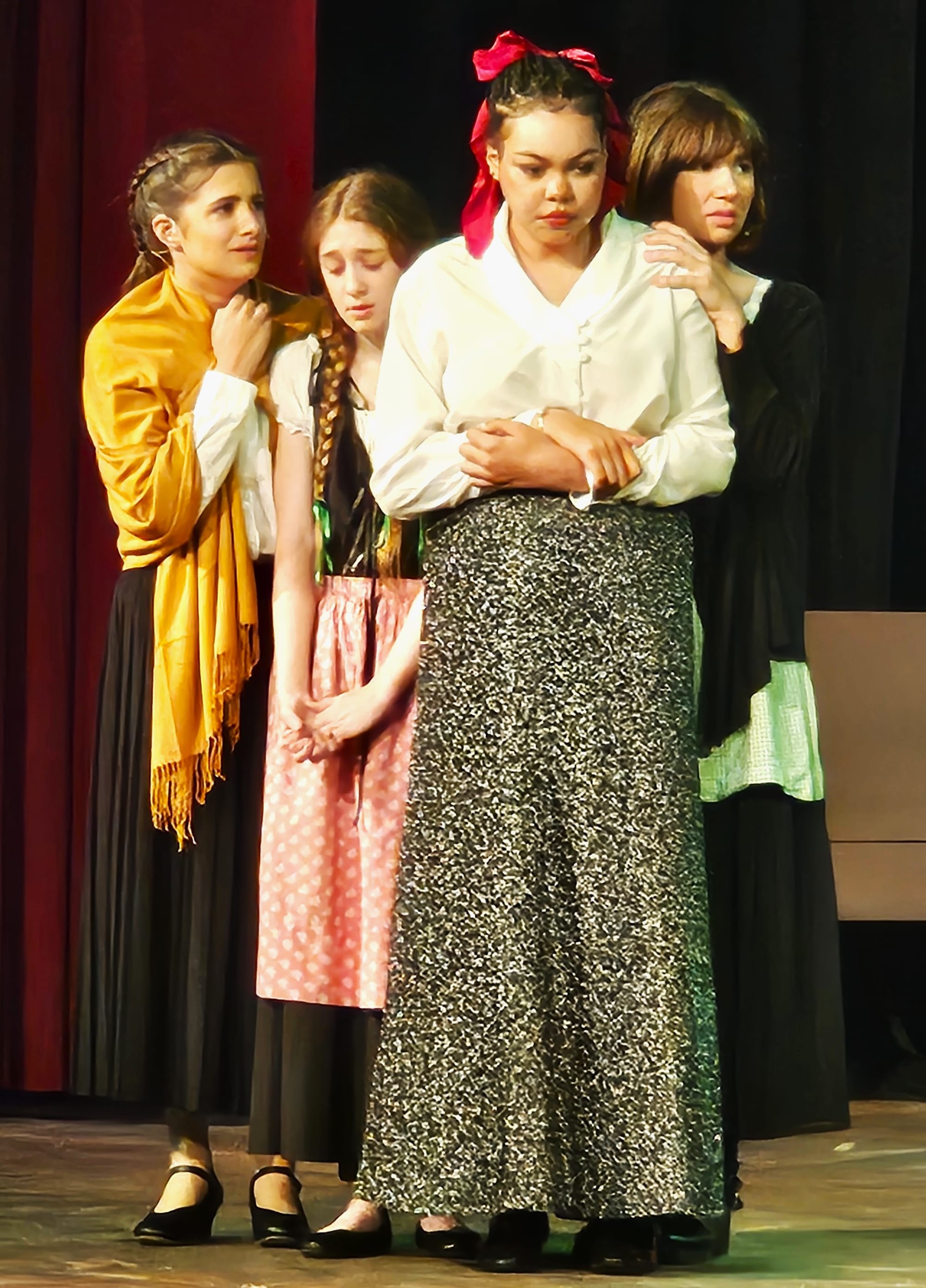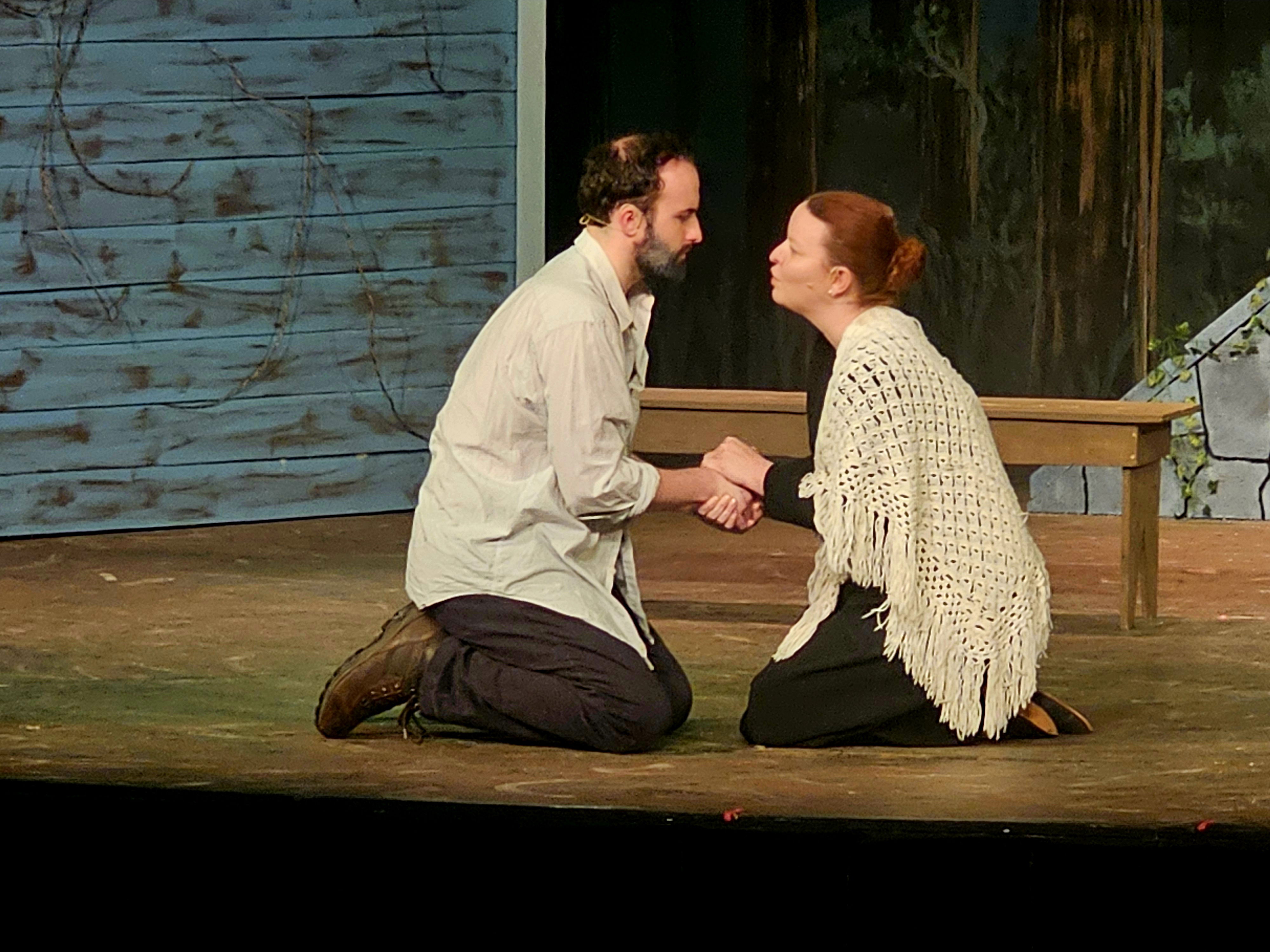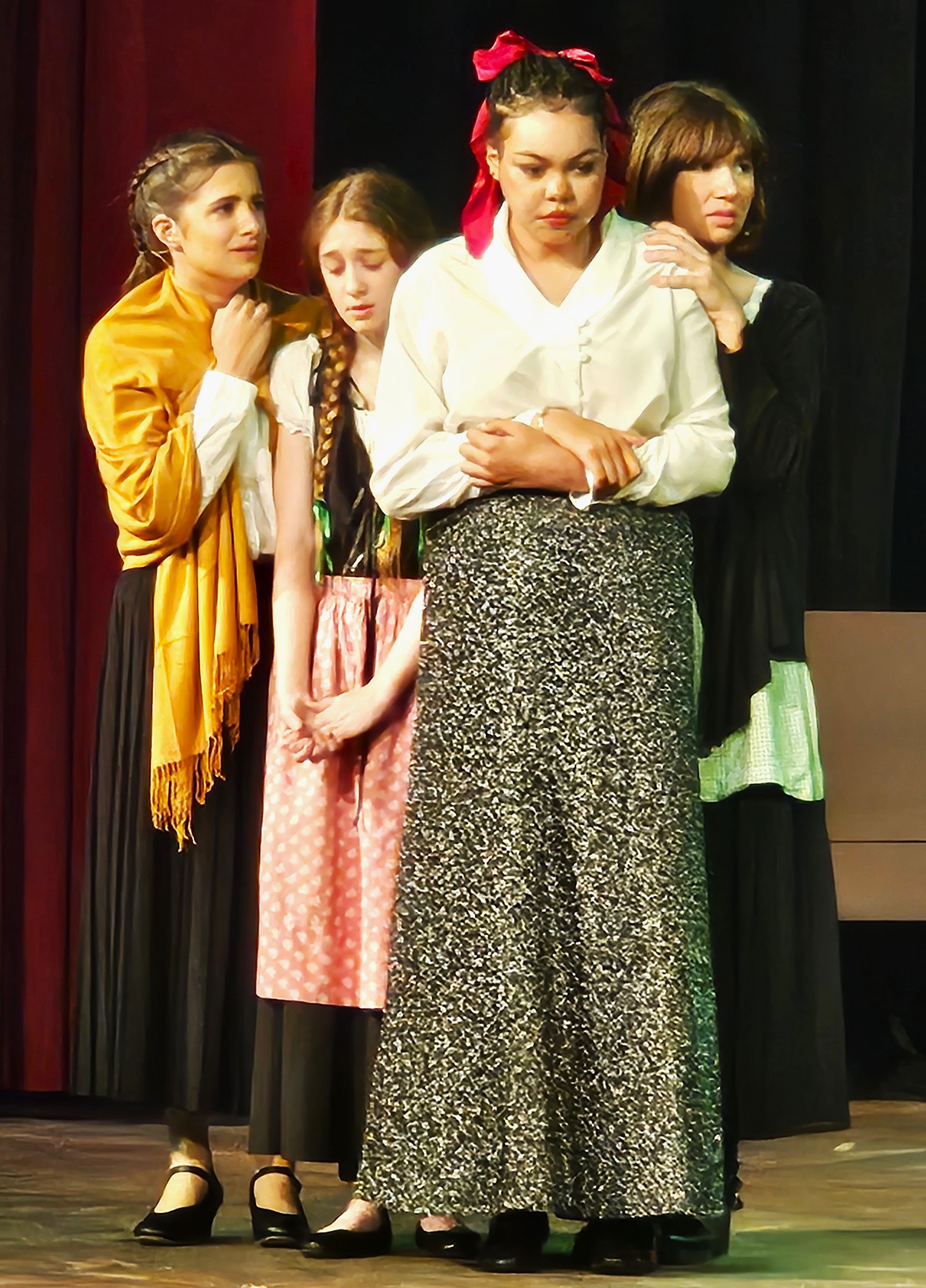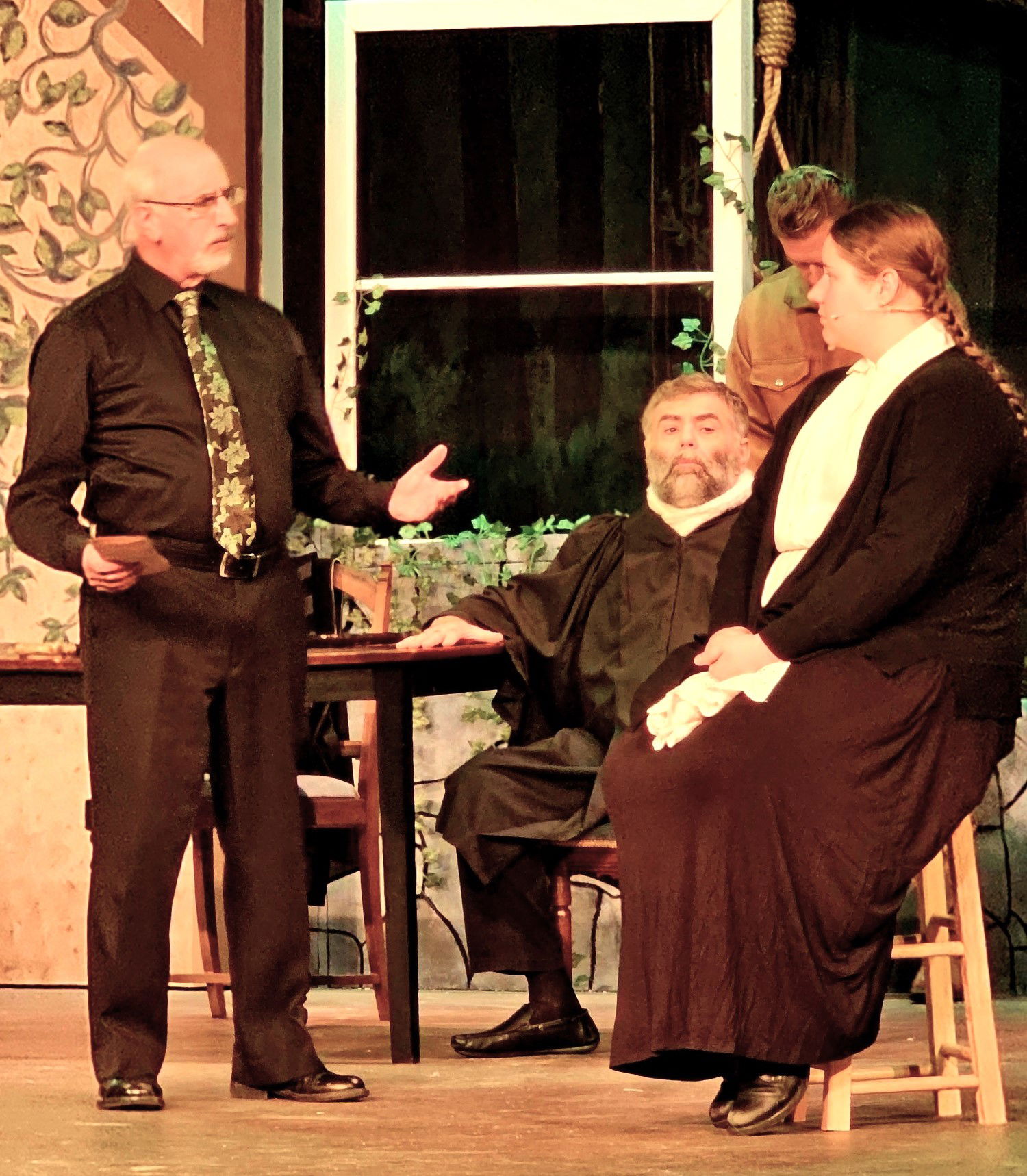"The Crucible" - by Arthur Miller - Theatre Of Northeastern Connecticut, Inc. at the Bradley Playhouse (Putnam, CT) - REVIEW

(Cover Photo: Ellie Kadamus as "Susanna Walcott," Nora Miller as "Betty Parris," Jaelyn Middleton as "Abigail Williams" and Kenni Bonczek as "Mercy Lewis" in a scene from Arthur Miller's "THE CRUCIBLE" at the Bradley Playhouse in Putnam, CT. through October 20, 2024. Photo Credit: Cindy Beckman)
By Kevin T. Baldwin
METRMAG Reviewer
# 774-242-6724
“It is the essence of power that it accrues to those with the ability to determine the nature of the real.”
- ("Judge Hathorne") / Arthur Miller

Theatre Of Northeastern Connecticut, Inc.
at the Bradley Playhouse
Presents the Arthur Miller Classic
"THE CRUCIBLE"
Written by Arthur Miller
Directed by Joshua Raymond
Assistant Director-Ty Collige
Original Music by C.S. Gollnick
Curtain Song by Oliver Ian Williamson
Stage Manager David Anderson
Cast Includes: Nora Miller as “Betty Parris,” Jordan Miller as “Reverend Samuel Parris,” Rae’anne Hazard as “Tituba,” Jaelyn Middleton as “Abigail Williams, ”Ellie Kadamus as “Susanna Walcott,” Faith Currier as “Mrs. Ann Putnam,” Darrel Sapp as “Thomas Putnam,” Kenni Bonczek as “Mercy Lewis,” Ella Woloski as “Mary Warren,” Stephen Clarke as “John Proctor,” Jessica Hall as “Rebecca Nurse,” Roy Simmons as “Giles Corey,” Huw Carter as “Reverend John Hale,” Tara Golson as “Elizabeth Proctor,” Dave Clark as “Francis Nurse,” James Ernest as “Ezekiel Cheever,” Oliver Ian Williamson as “John Willard,” Anthony Charles Ferreira as “Judge Hathorne,” Jim Douglas as “Deputy-Governor Danforth,” Cami Huizenga as “Sarah Good.”
Additional Creative Team:
Artistic Committee Liaison - Jeremy Woloski; Production Manager - Jeanne Foley; Production Coordinator - Kathleen Atwood; Set Design - Ty Collige, Joshua Raymond; Set Artists - Greg Brock, Diana Lee; Set Painters - Maria Bessette, Amanda Bessette, Sandy Lazarou, Jasmine Gervais, CAST; Costumer - Haley Raymond; Costuming Assistant - Cynthia Merrill; Makeup - Kyra Dionne; Props - Bonnie Theriault, Melinda Collelo; Lighting Design - Robyn De Gennaro, Joshua Raymond; Sound Design - David Anderson; Light and Sound Operator - Robyn De Gennaro; Set Crew - Decaf Manis, CAST; Set Construction - Ty Collige, David Anderson, Josh Raymond, Robyn De Gennaro and CAST; Photography - Ty Collige; Volunteer Coordinator - Cindy Beckman; Marketing Coordinator - Kendra Malizia; Business Manager - Kristi-Lyn Sadosky.
Performances:
October 4, 2024 through October 20, 2024
(Contact Box Office for Exact Times)
THE BRADLEY PLAYHOUSE, 30 Front Street (Route 44) in Putnam, CT.
TICKETS
All seats reserved. Reservations may be made with a major credit card online at www.thebradleyplayhouse.org or by calling 860-928-7887.
COVID 19 PROTOCOLS
Contact Venue for Most Updated COVID-19 Safety Protocols and Information.
The subject of the Salem Witch Trials comes to the Bradley Playhouse in Putnam in the form of Arthur Miller’s "THE CRUCIBLE" as staged by the Theatre of Northeastern Connecticut (TNECT).
Written by Miller in 1953, the historical play is set in Salem, Massachusetts Bay Colony shortly after the infamous Salem Witch Trials in 1692, which resulted in the deaths of 25 innocent women, men and children.
Right from the outset, let me point out that this is not a play everyone enjoys.
It is long (three hours), the language used is both archaic and loquacious and the overall pacing inherent with Miller’s story structure is dour and brooding (much like this review might seem).
Yet, "THE CRUCIBLE" remains a powerful allegorical story that speaks to American society and the catastrophic power of ignorance, which still exists even today.
"THE CRUCIBLE" premiered at the Martin Beck Theatre in New York City in 1953.
Both as a play and masterpiece of literature, even after 70 years, "THE CRUCIBLE" still retains much of its impact.
A fascinating element is in how this TNECT cast in 2024 at the Bradley Playhouse interpret the words of a male playwright's 1950s’ description and depiction of an oppressive and totalitarian society in the 1690s.
The overall performances by the TNECT principals seem uneven as some of Miller’s nuanced dialogue appears lost on some of the less experienced in the cast.
Yet, for those who seemed to have a keen grasp of the narrative, those performances make this a show well worth seeing.
The Puritan colony of Salem was an isolated theocratic society in constant conflict with Native Americans.
The above is not intended to excuse any crimes committed against Indigenous Americans - only to offer that there were menacing conditions these early settlers faced in addition to the menace wrought by their own ignorance.
Miller wrote "THE CRUCIBLE" as an allegory for McCarthyism, when then-Senator Joseph McCarthy was bent on spreading Communist hysteria, accusing and persecuting people of being communists.
Not that such hyperbole could ever cause any such hysteria these days, right?
Right?
In "THE CRUCIBLE," this is a colony with absolutely no sense of civil liberties.
Given their isolation from the rest of civilization, there are heightened tensions which come from unbelievably harsh conditions they endured and tragic events which have befallen many in the colony.
Ultimately, this results in all-encompassing superstitious paranoia which leads to the horrific events depicted in the play.
It is equally horrific to consider how those who stand by their truthful convictions find themselves at complete odds with those whose convictions lead to the annihilation of others.
Sound familiar?
It should.

(Photo: Stephen Clarke as “John Proctor,” Tara Golson as “Elizabeth Proctor" and Huw Carter as “Reverend John Hale” in a scene from Arthur Miller's "THE CRUCIBLE" at the Bradley Playhouse in Putnam, CT. through October 20, 2024. Photo Credit: Cindy Beckman)
As one begins watch (and consider) the Bradley Playhouse play, their first thought might be:
How could America, as we know it now, ever have evolved from such UN-evolved antagonists as depicted in the catastrophic events of "THE CRUCIBLE?"
Then, perhaps slowly...or, perhaps at lightning speed...they recall our recent socio-political antagonists such as (but not limited to) the folks from the Tea Party, the neo-fascist white nationalist Proud Boys, MAGA followers, QAnon followers, the far Christian right members of the United States Supreme Court and their overturning of Roe v. Wade, Rep. Marjorie Taylor Greene and her concept of "Jewish Space Lasers" - oh, and, of course, the most recent fallacy of “eating the dogs, eating the cats” in Springfield, Ohio.
America, in this election year 2024, has not only managed to match the "cray-cray" level depicted in Miller’s allegorical "THE CRUCIBLE" - America has surpassed it.
But enough politics.
Let's, instead, discuss the Bradley Playhouse staging and the story itself.
The TNECT cast at the Bradley work well together - and director Joshua Raymond has kept the pacing solid.
The production attempts to be as energetic in execution as possible.
The set for the TNECT staging is well designed and functions to help the set changes transition fluidly.
Costuming for the large cast was a curious blend of modern and period-specific garb and, while mostly this hybrid approach worked well, there were moments when it felt oddly out of place.
At the October 5th performance, specifically during Act Two, there was powerful feedback emitted by the sound system.
It is not certain whether the above was due to a singular microphone issue or if sound in general was impacted by that particular set configuration (it is also possible it was a combination of the two).
In any event, the cast dealt with the above problem in a completely professional manner.
The dialogue from the Miller script may be difficult for some to fully comprehend in terms of the vocabulary and vernacular inherent to the depicted ancient Salem colonists.
The best recommendation for these persons would be to watch and listen to how these moments are shared first and then “Google” any enigmatic wording later.

(Photo: Stephen Clarke as “John Proctor” with Tara Golson as “Elizabeth Proctor" in a pivotal moment from Arthur Miller's "THE CRUCIBLE" at the Bradley Playhouse in Putnam, CT. through October 20, 2024. Photo Credit: Cindy Beckman)
As the TNECT production of "THE CRUCIBLE" begins, Reverend Samuel Parris (Jordan Miller) prays over the bed of his “ill” daughter, Betty (Nora Miller).
Parris becomes responsible for starting the witch-panic in the community, even though he initially resists the belief that witchcraft is to blame for his daughter’s “spell.”
As the play reaches its apex, though, and in an adept performance given by Jordan Miller, it is Parris who champions the accusations, even though he eventually comes to regret his involvement.
Abigail Williams (Jaelyn Middleton) serves as the play’s greatest antagonist, or at least a villain in human form.
Middleton gives a commendable if less than nuanced performance as Williams, who leads a group of girls whose accusations cause innocent people to hang.
Parris, her uncle, questions Abigail about what she and the girls, including Betty, were all doing out dancing naked in the forest.
Yet, it is the manipulative Abigail who turns her own actions around and begins accusing multiple villagers of witchcraft to hide her own guilt…all in keeping with the actions of a woman scorned.
John Proctor (Stephen Clarke) stands up to Abigail and the other accusers but quickly evolves into a highly self-conflicted, complex character.
A major element to the story is that Proctor had sex with 17-year-old Abigail when she served as the Proctor’s housekeeper.
He had previously confessed his transgression to his wife, Elizabeth (Tara Golson), who put Abigail out and now Abigail seeks revenge.
Through Abigails’ manipulative efforts, Proctor is arrested and set to hang. Giles Corey (Roy Simmons) is a benign sort but is forced to speak out against the ludicrous actions caused by the trial and is subsequently accused of witchcraft.
Like Clarke as Proctor, Simmons as Corey is at his strongest when refusing to divulge names of others who might also find themselves in danger of being accused and subsequently put to death.
The above is another fine example of Miller’s use of allegory, alluding to those who in the 1950s had the strength of character to hold their ground at the McCarthy era trials and not be bullied into betraying others.

(Photo: Ellie Kadamus as "Susanna Walcott," Nora Miller as "Betty Parris," Jaelyn Middleton as "Abigail Williams" and Kenni Bonczek as "Mercy Lewis" in a scene from Arthur Miller's "THE CRUCIBLE" at the Bradley Playhouse in Putnam, CT. through October 20, 2024. Photo Credit: Cindy Beckman)
Huw Carter gives a bravura performance as the TNECT show’s most layered character, the Reverend John Hale, showcasing the utmost proficient grasp of Miller’s dialogue.
Called to Salem by Parris, Hale is a supposed “expert in witchcraft” and it is his expertise that is intended to confirm whether or not witchcraft is present in Salem.
After meeting with Abigail and the others suspected of sorcery, Hale is convinced that witches are present in Salem.
However, in Carter’s insightful performance, over the course of the play, Hale begins to show us he is capable of reason as he begins to doubt his own conclusions and soon denounces the proceedings by the court caused in part by his own actions.
Tara Golson is outstanding as Elizabeth, who is subsequently arrested, even though her execution is delayed because she is pregnant.
It is through her interactions with Clarke as John Proctor that show us how her character serves as his ultimate conscience and moral guide.
(Note: Last year, a marvelous show entitled “John Proctor is the Villain” was reviewed by METRMag which called into question elements of the patriarchy and dominating male oppression depicted in "THE CRUCIBLE" and that might well be a perfectly valid discussion for folks to continue to have – but that can be addressed another time.)
Another standout performance comes from Jim Douglas as Deputy Governor Danforth, the ultimate representative of authority and government in Salem.
It is through the actions of this Governor that most of the play’s atrocities are committed to save face, with Danforth serving much as a flawed “Pontius Pilate” to John Proctor’s flawed “Jesus.”
While seemingly driven by his so-called religious “theology,” Danforth causes the deaths of hundreds of innocent people rather than to admit that he and the government were all driven by ignorance.

(Photo: Jim Douglas as “Deputy-Governor Danforth," Anthony Charles Ferreira as “Judge Hathorne,” Oliver Ian Williamson as “John Willard” and Ella Woloski as “Mary Warren” in a scene from Arthur Miller's "THE CRUCIBLE" at the Bradley Playhouse in Putnam, CT. through October 20, 2024. Photo Credit: Jeanne Foley)
There is an overwhelming theme in "THE CRUCIBLE" showing how, when a person selfishly attempts to preserve one's own reputation (in this case, Danforth), they actually cause more harm and an increased hysteria produced by ignorance.
Conversely, by keeping their head, their self-respect and their integrity, that person, in this case, Proctor, actually might serve as a community's "moral compass," attempting to keep others calm, rational and safe.
Unfortunately, in the case of Proctor, the hysteria proves relentless.
Other powerful elements to the two-act drama include: social pressure, religious and sexual persecution, paranoia, respect, ignorance, jealousy and, above all, forgiveness.
To Danforth, in charge of the "trial," those accused of any crime are not "innocent until proven guilty."
In fact, the opposite proves more accurate.
The truth means little in this sorely misguided ancient community of Salem, portrayed well by a fine, large supporting cast, but especially this is true in Danforth.
"Common sense" as applicable here is neither "common" nor "sensible."
Conclusions are reached that would never come to any other rational thinking person.
And, much like Proctor, innocents are doomed simply because they did not want to confess to something that they did not do.
Witchcraft was not the plague.
Ignorance was, and still is, the plague.
Knowledge was, and still is, the cure.
As written, the character of Danforth has moments where it appears the Governor wants to serve justice well given the situation - even pointing out notable "character flaws" in several of the antagonists.
However, to service justice the only way he knows how, the Governor still proves to be a horrific product of his time.
The TNECT production of Arthur Miller’s "THE CRUCIBLE" continues at the Bradley Playhouse in Putnam, CT. until October 20th and, as we may learn in a few weeks just how far America has come, the biggest lesson learned from this tale...is that we still have so much more to learn.
Coming up at Theatre Of Northeastern Connecticut (TNECT) will be "MIRACLE ON 34TH STREET," beginning December 6th, 2024.
Approximately three hours with one intermission.
Kevin T. Baldwin is a member of the American Theatre Critics Association (ATCA)
@MetrmagReviews
@Theatre_Critics


ABOUT THE SHOW
Widely considered one of the greatest American plays ever written, "THE CRUCIBLE" dramatizes the Salem, MA. witch trials of the late 1600s.
Miller originally wrote the piece in response to the McCarthy-era communist “witch hunt” that gripped the United States in the 1950s.

ABOUT THE BRADLEY PLAYHOUSE
THE BRADLEY PLAYHOUSE is a 117 year-old vaudeville theatre in the heart of the Putnam antiques and restaurant district in the “Quiet Corner” of Northeastern Connecticut. Since 1991, THE BRADLEY PLAYHOUSE has been managed by the volunteers of The Theatre of Northeastern Connecticut, Inc. (TNECT).
ABOUT THEATRE OF NORTHEASTERN CONNECTICUT (TNECT)TNECT produces eight main season shows per year and a number of special fundraising events for THE BRADLEY PLAYHOUSE Restoration Fund. TNECT’s mission is to produce and sponsor quality theatre and entertainment for the residents of Northeastern Connecticut and the surrounding areas, to encourage the development of creativity through the support of local artists, and to support education and hands-on experience in the creation, direction, and production of theatre and the performing arts.
30 Front Street
P.O. Box 71
Putnam, CT 06260-1942


